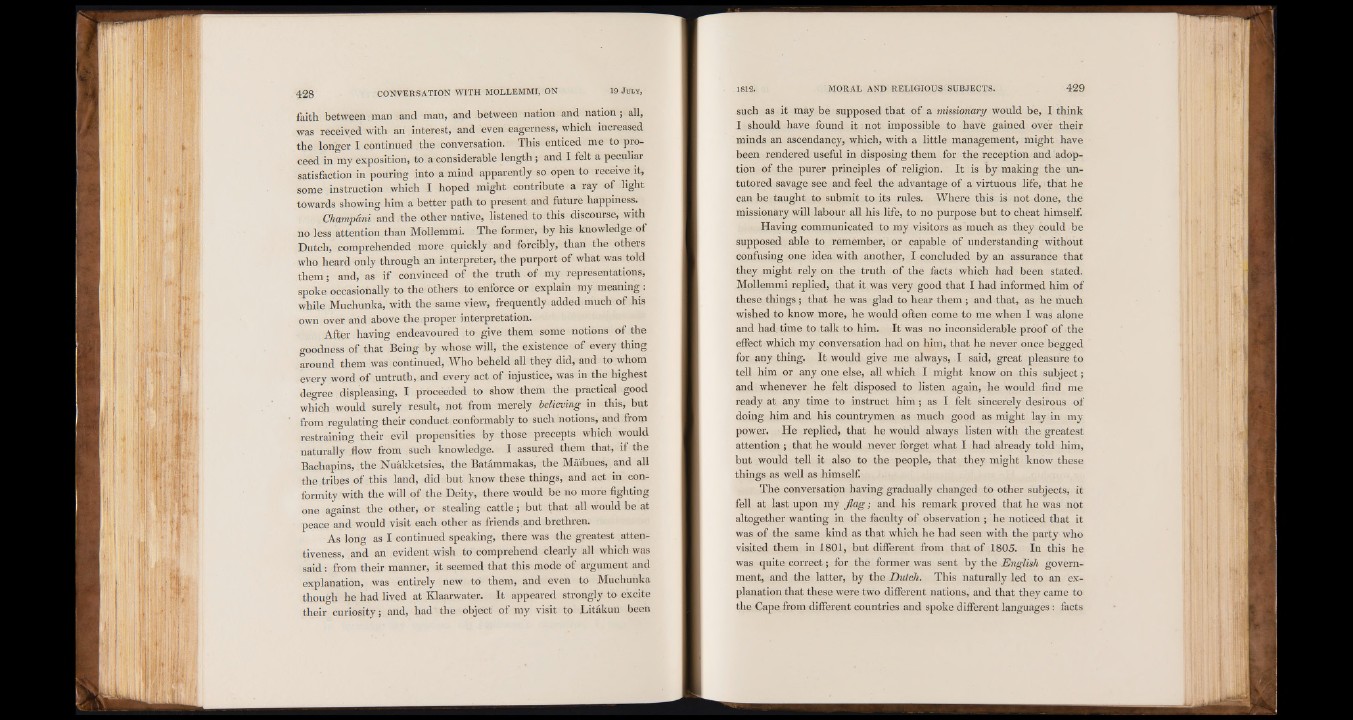
faith between man and man, and between nation and nation; all,
was received with an interest, and even eagerness, which increased
the longer I continued the conversation. This enticed me to proceed
in my exposition, to a considerable length; and I felt a peculiar
satisfaction in pouring into a mind apparently so open to receive it,
some instruction which I hoped might contribute a ray of light
towards showing him a better path to present and future happiness.
Champdni and the other native, listened to this discourse, with
no less attention than Mollemmi. The former, by his knowledge of
Dutch, comprehended more quickly and forcibly, than the others
who heard only through an interpreter, the purport of what was told
them; and, as if convinced of the truth of my representations,
spoke occasionally to the others to enforce or explain my meaning :
while Muchunka, with the same view, frequently added much of his
own over and above the proper interpretation.
After having endeavoured to give them some notions of the
goodness of that Being by whose will, the existence of every thing
around them was continued, Who beheld all they did, and to whom
every word of untruth, and every act of injustice, was in the highest
degree displeasing, I proceeded to show them the practical good
which would surely result, not from merely believing in this, but
from regulating their conduct conformably to such notions, and from
restraining their evil propensities by those precepts which would
naturally flow from such knowledge. I assured them that, if the
Bachapins, the Nuakketsies, the Batammakas, the Maibues, and all
the tribes of this land, did but know these things, and act in conformity
with the will of the Deity, there would be no more fighting
one against the other, or stealing cattle; but that all would be at
peace and would visit each other as friends and brethren.
As long as I continued speaking, there was the greatest attentiveness,
and an evident wish to comprehend clearly all which was
said: from their manner, it seemed that this mode of argument and
explanation, was entirely new to them, and even to Muchunka
though he had lived at Klaarwater. It appeared strongly to excite
their curiosity; and, had the object of my visit to Litakun been
such as it may be supposed that of a missionary would be, I think
I should have found it not impossible to have gained over their
minds an ascendancy, which, with a little management, might have
been rendered useful in disposing them for the reception and adoption
of the purer principles of religion. It is by making the untutored
savage see and feel the advantage of a virtuous life, that he
can be taught to submit to its rules. Where this is not done, the
missionary will labour all his life, to no purpose but to cheat himself.
Having communicated to my visitors as much as they could be
supposed able to remember, or capable of understanding without
confusing one idea with another, I concluded by an assurance that
they might rely on the truth of the facts which had been stated.
Mollemmi replied, that it was very good that I had informed him of
these things ; that he was glad to hear them ; and that, as he much
wished to know more, he would often come to me when I was alone
and had time to talk to him. It was no inconsiderable proof of the
effect which my conversation had on him, that he never once begged
for any thing. It would give me always, I said, great pleasure to
tell him or any one else, all which I might know on this subject;
and whenever he felt disposed to listen again, he would find me
ready at any time to instruct him ; as I felt sincerely desirous of
doing him and his countrymen as much good as might lay in my
power. He replied, that he would always listen with the greatest
attention ; that he would never forget what I had already told him,
but would tell it also to the people, that they might know these
things as well as himself.
The conversation having gradually changed to other subjects, it
fell at last upon my fla g ; and his remark proved that he was not
altogether wanting in the faculty of observation ; he noticed that it
was of the same kind as that which he had seen with the party who
visited them in 1801, but different from that of 1805. In this he
was quite correct; for the former was sent by the English government,
and the latter, by the Dutch. This naturally led to an explanation
that these were two different nations, and that they came to
the Cape from different countries and spoke different languages: facts